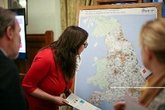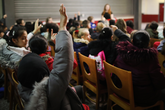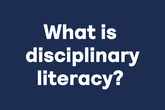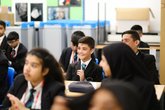What is literacy?

The word literacy is defined as the ability to read, write, speak and listen in a way that lets us communicate effectively and make sense of the world.
The importance of literacy
Understanding the significance of literacy goes far beyond its definition.
Literacy is essential. Without literacy, it’s hard to live the life you want. From your earliest years, literacy skills help you develop and communicate. But when you have a tough start in life, it’s easy to fall behind.
At school, having the literacy skills to read, write, speak and listen are vital for success. If you find these things hard, then you struggle to learn. It affects your confidence and self-esteem.
As an adult, without these same literacy skills, you can’t get the jobs you want, and navigating every day life can be difficult – from using the internet, to filling out forms or making sense of instructions on medicines or road signs. If you have children, it’s hard to support their learning, and so the cycle continues.
Low levels of literacy undermine the UK’s economic competitiveness. Each year group of 5-year-olds who do not meet the expected early years standard generate lifetime economic costs of around £830 million (Pro Bono Economics, 2024). A third of businesses are not satisfied with young people’s literacy skills when they enter the workforce and a similar number have organised remedial training for young recruits to improve their basic skills, including literacy and communication (CBI, 2017).
Literacy statistics
Our research underpins our programmes, campaigns and policy work to improve literacy skills, attitudes and habits across the UK.
-
Children who enjoy reading and writing are happier with their lives
Children who enjoy reading are three times more likely to have good mental wellbeing than children who don’t enjoy it. Read our research report from 2019.
-
1 in 10 children and young people aged 5 to 18 say they do not have a book of their own at home.
Book ownership is one of the top three predictors of reading performance (Lindorff et al., 2023). More than three times as many book owners read daily Read our Book ownership in 2024 report.
-
Children born into communities with the most serious literacy challenges have some of the lowest life expectancies in England
A boy born in Stockton Town Centre (an area with serious literacy challenges) has a life expectancy 26.1 years shorter than a boy born in North Oxford. Read more.
-
Just 1 in 3 children in the UK enjoy reading
Only 1 in 3 (32.7%) children and young people said they enjoy reading in early 2025, the lowest percentage since we first asked the question in 2005. Read more.
-
3 in 10 children in the UK enjoy writing
In 2024, fewer than 3 in 10 (28.7%) children and young people aged 8 to 18 enjoy writing in their free time. Our 2024 report showed that levels of writing enjoyment have reduced by 18.1 percentage points over the last 14 years.
-
Audiobooks can support wider literacy engagement
Almost 2 in 5 (37.5%) children and young people said that listening to an audiobook or podcast has got them interested in reading books. Read more.
What is the future of literacy?
We live in an increasingly digital world. Come on a journey with us to determine and define what is the future of literacy as we explore how children and young people engage with language and literacy in an evolving landscape.

Adult literacy rate
1 in 6 (18%) of adults in England, or 6.6 million people, can be described as having 'very poor literacy skills'. Adults with poor literacy skills may be locked out of the job market and, if they become a parent, may find it more difficult to support their child’s learning.
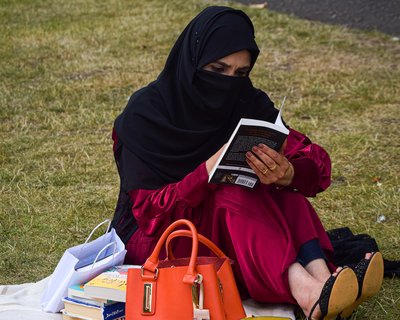
But that's not the end of the story...
We believe that together, we can break the cycle. We believe that literacy is for everyone so we continue to work in schools and with communities to bring real change through our inspiring and evidence-based programmes, resources and activities.
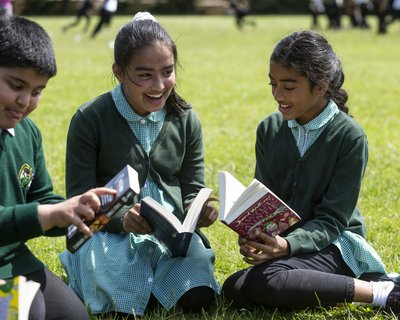
More information about literacy
-
How does literacy in England stack up against other European countries?Learn more
-
How does the national curriculum work in England, Wales, Northern Ireland & Scotland?Learn more
-
What opportunities and challenges does digital technology present to children's literacy?Learn more
Understanding literacy in all its forms
Our understanding of what it means to be literate goes beyond being able to read and write, although these are vital skills. It also includes oracy skills so we can effectively communicate and share our authentic voice and experience. It means honing our ability to listen and understand. In an evolving digital age and as we consider what literacy skills are required to thrive on and offline, we must also start to unpack the importance of topics like media literacy, digital and information literacy, Ai and Literacy, and financial literacy. Explore more below:
-
New to, or developing your understanding of the concept of disciplinary literacy? This course introduces the concept and explores practical classroom strategies.Book CPD training
-
What opportunities and challenges does digital technology present to children's literacy?Read about Digital literacy
-
We explore the relationship between AI and literacy within an education setting, using findings from our latest research and commentary.Learn more
-
Research shows that audiobooks can support children's reading skills.Explore Audiobooks and literacy
-
Research shows that playing video games can support young people's reading, writing and communication skills.Discover more about video games and literacy
-
What is media literacy and why is it important for adults and children alike to develop the relevant skills to be able to critic, analyse and evaluate media in all its forms?Learn about media literacy
-
Discover why oracy is important and the ways we are supporting children and young people to develop their oracy skills.Learn more
